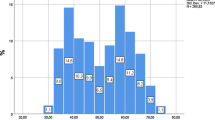Abstract
Scientific performance — as well as performance in any other occupational field — depends on a variety of influences. Familial and social background form a person’s attitudes and expectations; his or her education provides a basis for further development; societal needs and conditions of the labour market determine the chances to work in different occupational fields; socioeconomic status, gender, religious denomination, home environment, intellectual stimulation, organisational policy, resources and many other circumstances influence scientific performance. How much room is there left for individual characteristics and competencies as independent variables? Can occupational success as a scientist be predicted by individual parameters?
Access this chapter
Tax calculation will be finalised at checkout
Purchases are for personal use only
Preview
Unable to display preview. Download preview PDF.
Similar content being viewed by others
References
Boudreau, J.W. (1989). Selection utility analysis. In M. Smith & I.T. Robertson (Eds.), Advances in selection and assessment(pp.227-257). New York: Wiley.
Cattell, R.B., Sauders, D.R., & Stice, G. (1957) Sixteen personality factor questionnaire. Champaigne: Institute for Personality and Ability Testing.
Eysenck, H.J. (1995). Genius. The natural history of creativity. Cambridge: Cambridge University Press.
Feist, G. J. (1999). The influence of personality on artistic and scientific creativity. In R. J. Sternberg (Ed.), Handbook of creativity(pp. 273-296). Cambridge: Cambridge University Press.
Frederiksen, N. (1973). Development of provisional criteria for the study of scientific creativity. Educational Testing Service. Paper presented at the Annual Meeting of the American Educational Association, New Orleans.
Frei, R.L., Raciot, B. & Travagline, A. (1999). The impact of monochronic and Type A behavior patterns on research productivity and stress. Journal of Managerial Psychology, 14, 374-387.
Funke, U., Krauß, J., Schuler, H. & Stapf, K.H. (1987). Zur Prognostizierbarkeit wissenschaftlich-technischer Leistungen mittels Personvariablen: Eine Metaanalyse der Validität diagnostischer Verfahren im Bereich Forschung und Entwicklung [Prediction of scientific-technical performance: A meta-analysis]. Gruppendynamik, 18, 407-428.
Funke, U. & Schuler, H. (1986). Personalauswahl im Bereich industrieller Forschung und Entwicklung - Forschungsstand und Perspektiven. [Personnel selection in industrial research and development - state of research and perspectives] Psychologie und Praxis. Zeitschrift fur Arheits- und Organisationspsychologie,30, 34-51.
Ghiselli, E.E. (1954). The forced-choice technique in self-description. Personnel Psychology,7, 201-208.
Hunter , J. E. & Hunter R.F. (1984). Validity and utility of alternative predictors of job performance. Psychological Bulletin,96, 72-98
Hunter, J.E. & Schmidt, F.L. (1990). Methods of meta-analysis. Correcting error and bias in research findings. Newbury Park: Sage.
Kahn, J.H. & Scott, N.A. (1997). Predictors of research productivity and science-related career goals among counseling psychology doctoral students. Counselling Psychologist,25, 38-67.
Hurley, John (1997) Organisation and Scientific Discovery. John Wiley New York
Kapsales, P.P. (1998). Achievement in R&D: A study of the communication, information, and organization characteristics of outstanding achievers. Dissertation Abstracts International Section A. Humanities & Social Sciences. Vol 58(11-A)4345
Martindale, C. (2001). Oscillations and analogies: Thomas Young, MD, FRS, genius. American Psychologist,56, 342-345.
McCarrey, M.W., & Edwards, S.A.(1972). Hierarchies of scientist goal objectives: Individual characteristics and performance correlates.Journal of Applied Psychology,56, 271-272.
McCormick, E.J. & Tiffin, J. (1974). Industrial psychology(6th ed.). Englewood Cliffs: Prentice-Hall.
Moser, K., Schuler, H. & Funke, U. (1999). The moderating effect of raters´ opportunities to observe ratees’ job performance on the validity of an assessment center. International Journal of Selection and Assessment,7, 133-141.
Pervin, L.A. & John, O.P. (2001). Personality. Theory and research(8th ed.). New York: Wiley.
Schmidt, F.L. & Hunter, J.E. (1983). Individual differences in productivity: An empirical test of estimates derived from studies of selection procedure utility. Journal of Applied Psychology, 68, 407-414.
Schmidt, F.L. Hunter, J.E. (1998). The validity and utility of selection methods in personnel psychology: Practical and theoretical implications of 85 years of research findings. Psychological Bulletin, 124, 262-274.
Schneider, B. (1987). The people make the place. Personnel Psychology, 40, 437-453.
Schneider, B. Goldstein, H.W. & Smith, D.B. (1995). The ASA framework: An update. Personnel Psychology,48, 737-773.
Schuler, H. (1989 a). Some advantages and problems of job analysis. In M. Smith & I.T. Robertson (Eds.), Advances in selection and assessment(pp. 31-42). New York: Wiley.
Schuler, H. (1989 b). Construct validity of a multimodal employment interview. In B.J. Fallon, H.P. Pfister & J. Brebner (Eds.), Advances in Industrial Organizational Psychology(pp. 343 354). Amsterdam: North-Holland, Elsevier.
Schuler, H. & Funke, U. (1989). The interview as a multimodal procedure. In R.W. Eder & G.R. Ferris (Eds.), The employment interview - theory, research, and practice(pp. 183-192). Newbury Park: Sage.
Schuler, H. Funke, U., Moser, K. & Donat, M. (1995). Personalauswahl in F&E. Eignung und Leistung von Wissenschaftlern und Ingenieuren[Personnel selection in R&D. Aptitudes and performance of scientists and engineers]. Göttingen: Hogrefe
Smith, P.C. & Kendall, L.M.(1963). Retranslation of expectations: An approach to the construction of unambiguous anchors for rating scales. Journal of Applied Psychology,47, 149-155.
Terman, L.M. & Oden, M.H. (1959). The gifted group at mid-life: 35 years’ follow-up of the superior child. Stanford CA: Stanford University Press.
Viswesvaran, C., Ones, D.S. & Schmidt, F.L. (1996). Comparative analysis of the reliability of job performance ratings. Journal of Applied Psychology,81, 557-574.
Author information
Authors and Affiliations
Editor information
Editors and Affiliations
Rights and permissions
Copyright information
© 2003 Springer Science+Business Media Dordrecht
About this chapter
Cite this chapter
Schuler, H. (2003). The Selection of Effective Scientists. In: Hurley, J. (eds) Scientific Research Effectiveness. Springer, Dordrecht. https://doi.org/10.1007/978-94-010-0275-2_8
Download citation
DOI: https://doi.org/10.1007/978-94-010-0275-2_8
Publisher Name: Springer, Dordrecht
Print ISBN: 978-94-010-3961-1
Online ISBN: 978-94-010-0275-2
eBook Packages: Springer Book Archive




